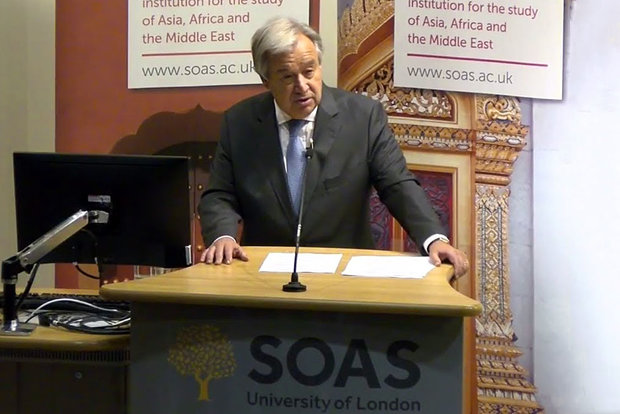“Terrorism has been unfortunately with us in various forms across ages and continents,” Mr. Guterres said in a lecture on counter-terrorism and human rights at the School of Oriental and African Studies of the University of London.
“But modern terrorism is being waged on an entirely different scale, and notably its geographic span. No country can claim to be immune,” he added.
Last year, more than 25,000 people died and 33,000 injured in at least 11,000 terrorist attacks in more than 100 countries.
In 2016, nearly three-quarters of all deaths caused by terrorism were in just five states: Iraq, Afghanistan, Syria, Nigeria and Somalia. The global economic impact of terrorism is estimated to have reached $90 billion in 2015. That year, terrorism costs amounted to 17.3 per cent of gross domestic product (GDP) in Iraq and 16.8 per cent in Afghanistan.
Recalling how the Magna Carta 800 years ago established the principle of the rule of law, the Secretary-General said that at its core, human rights are a true recognition of common humanity.
He went on to underscore five key counter-terrorism priorities.
First, he stressed the need for much stronger international cooperation, announcing that he intends to convene the first-ever UN summit of heads of counter-terrorism agencies next year to forge new partnerships and build relationships of trust.
Second is a sustained focus on prevention, which includes addressing the factors that radicalize young people and make terrorism a fateful option for them.
Terrorists are losing physical ground in Syria and Iraq, but gaining virtual ground in cyberspace. Facebook, Microsoft, Twitter and YouTube have launched an anti-terror partnership, the ‘Global Internet Forum to Counter Terrorism,’ aimed at thwarting the spread of extremist content online.
“When we protect human rights, we are tackling the root causes of terrorism. For the power of human rights to bond is stronger than the power of terrorism to devastate,” he said.
“This is a start. We need to keep the momentum,” he said.
Third is to uphold human rights and the rule of law.
Facing threats of an unprecedented nature, States are scrambling to enhance efficiency of their counter-terrorist legislation. Without a firm basis in human rights, counter-terrorism policies can be misused and abused, for instance, to suppress peaceful protests and legitimate opposition movements.
Fourth, the battle of ideas must be won. “We should never shrink from pointing out the cynicism and errors of terrorism. At the heart of darkness, we should build a new age of enlightenment,” Mr. Guterres said.
“When terrorists portray violence as the best way of addressing inequality or grievances, we must answer with non-violence and inclusive decision-making,” he added.
The Secretary-General’s fifth priority is to lift up the voices of the victims of terrorism. Some of the best guides are the victims and survivors of terrorist attacks, who consistently call for accountability and results – not blanket measures or collective punishments.
He urged young people to become clear-thinking and enlightened citizens.
HA/PR

























Your Comment